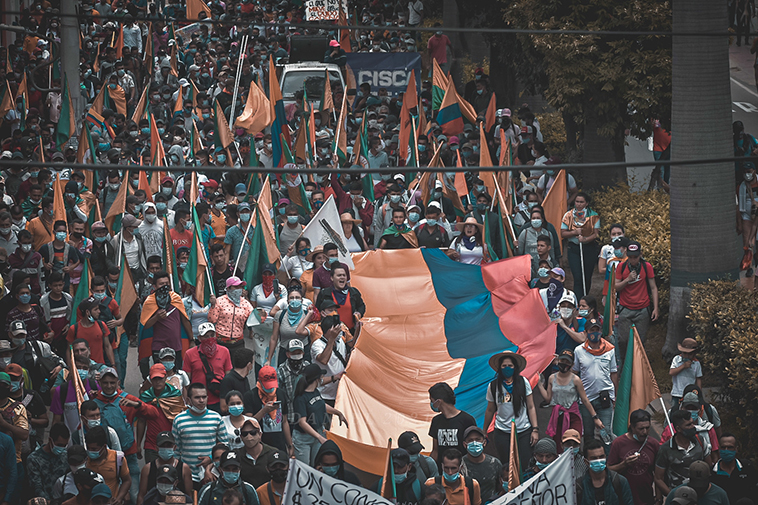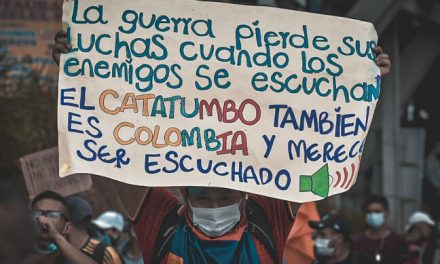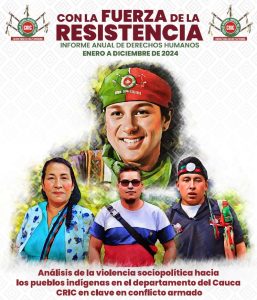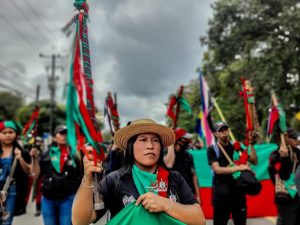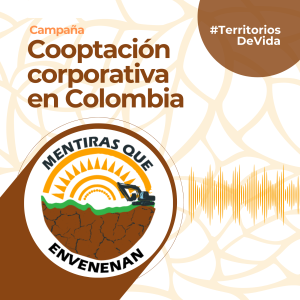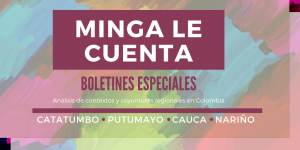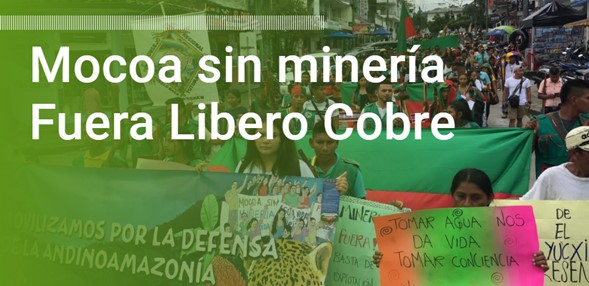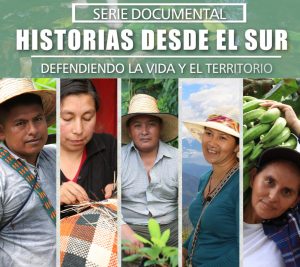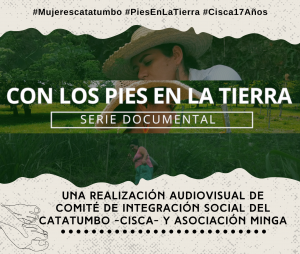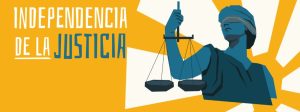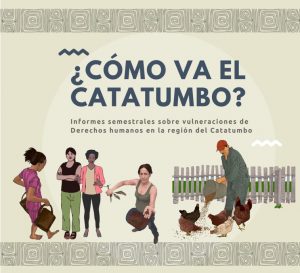El hecho más significativo de este período indudablemente ha sido el Paro Nacional, no sólo por las dimensiones alcanzadas, en su extensión social, territorial y temporal, que lo ubican como la protesta social más incidente de las últimas décadas; también porque evidenció la magnitud de la crisis multidimensional que vive el país, poniendo en cuestión el modelo económico, la democracia y hasta los símbolos culturales y los valores éticos. En este escenario, donde la inestabilidad que experimenta gran parte de la sociedad colombiana no tiene respuestas seguras y simplemente explota en múltiples manifestaciones de indignación, y donde el carácter elitista y autoritario del gobierno Duque tiene que exponerse sin ornamentos, tenemos el reto de dinamizar las apuestas por la paz, los derechos, las garantías y la participación.
El paro puso de presente unas condiciones sociales que se han tornado inaguantables, cuya dramática cuantificación fue presentada por el DANE en abril de este año señalando una pobreza monetaria en la población del 42.5%; es decir, personas con ingresos menores a $300.000 al mes. Registra además un desempleo del 17.5% (4,5 millones de personas), que en el caso de las mujeres es de 23% y en el de jóvenes el 22.5%. De los empleos perdidos en el último año, 2 de cada 3 corresponden a mujeres.
Situaciones agravadas con el manejo irresponsable dado por el gobierno a la pandemia, no sólo frente a su impacto sanitario que para abril superaba ya las 500 muertes diarias, y una lenta campaña de vacunación; también frente a su impacto socioeconómico, donde mostró un abierto privilegio por proteger los grandes emporios empresariales, ofreciendo alternativas pírricas a los gremios menores. El cierre de miles de pequeñas y medianas empresas da cuenta de los criterios de prioridad del gobierno, lo cual ha impactado fundamentalmente el empleo por cuanto este sector ocupa el 80% del mercado laboral. Y a pesar de la crisis social, el gobierno no accedió a establecer una renta básica ni la matrícula cero aduciendo dificultades fiscales, en medio de hechos de corrupción y derroche presupuestal denunciados por diferentes organismos y medios de comunicación.
Pero es en el terreno político e institucional en donde el Paro Nacional ha hecho notar el desmantelamiento del Estado Social de derecho por parte de un gobierno de Partido quien en los 20 años en el poder ha copado la casi totalidad del Estado.
El Paro Nacional ha hecho ver: uno, que no hay ninguna institución que vele por los derechos de la ciudadanía, y se ha debido apelar a la Comunidad Internacional para ello; dos, que la extensión del Estado de emergencia declarado a raíz de la pandemia otorgándole facultades excepcionales a la Presidencia, le ha servido para neutralizar también el control político del Congreso; tres, que la respuesta represiva del gobierno se encamina por unas medidas que cada vez más restringen las libertades públicas y militarizan la vida nacional, como lo es el Decreto 575, además de alentar expresiones de paramilitarismo urbano; cuatro, que la sistemática estigmatización de la ciudadanía manifestante induciendo la idea del “enemigo interno”, justifica el tratamiento de guerra; y, cinco, que la masiva violación de derechos humanos en el Paro no es admitida por el Gobierno, a pesar de ocupar el segundo país en el mundo donde la protesta social ha sido tan violentamente reprimida, actuando en contravía de cuestionamientos y recomendaciones de otros gobiernos, misiones y organismos internacionales, incluyendo la de la CIDH.
Para cerca del 85% de la población, según las encuestas, hay un reconocimiento en que el gobierno no solamente es el responsable de la crisis económica, social, política e institucional, sino que tampoco está en disposición a resolverla, en razón a su negacionismo y la permanente culpabilización de actores ajenos a su administración y a su Partido. Que insistirá en la reforma tributaria y demás, que no va a detener el asesinato de líderes, que no va a investigar los crímenes de la Fuerza Pública y que antes de sentarse a dialogar la crisis social, mantendrá su línea represiva. El gobierno sostiene tal posición autoritaria en tanto confía en que tiene el control del aparato estatal y el respaldo de la cúpula de las Fuerzas Armadas, como también de los grandes grupos económicos y sus medios de comunicación.
Una amplia franja de la población se ha sentido convocada a pensarse el país y su horizonte, y a pesar de la incertidumbre que crea el desmoronamiento de los pilares de una normalidad artificial, emergen indicios de futuro en torno a la necesidad de recuperar el proceso de paz, de plantearse el cambio del modelo económico, el restablecimiento del Estado Social de Derecho, el desmonte de la Doctrina de Seguridad Nacional que rige a las FFMM, junto con la reestructuración de la Policía Nacional, asuntos cruciales hacia donde están conduciendo las reflexiones sobre el escenario del Paro.
Y ante un gobierno cerrado al diálogo, todas las expectativas se encaminan a que las elecciones del próximo año sean la oportunidad política de corregirle el rumbo al país. Sin embargo, se hace necesario leer muy detenidamente todas las líneas del Paro, para intentar comprender qué angustias y qué esperanzas se convocan en esas múltiples formas de lo colectivo, con incredulidades frente a los sistemas representativos y con nuevos códigos resignificando los símbolos y los espacios.
En este ambiente de reconocimiento internacional de la crisis de DH y paz, de renovación de conciencias y promesas de país, de la emergencia de liderazgos sociales y la creación de nuevos espacios de articulación y participación, sin obviar la creciente violencia política, pensamos se abren oportunidades para avanzar en la construcción de los proyectos de vida.
————
THE NATIONAL STRIKE: OUTRAGE BEFORE ELITISM AND AUTHORITARIANISM
The most significant event of this period has undoubtedly been the National Strike, not only because of the dimensions reached, in its social, territorial, and temporal extension, which place it as the most incident social protest in recent decades; also because it has evidenced the magnitude of the multidimensional crisis that the country is experiencing, calling into question the economic model, democracy and even cultural symbols and ethical values. In this scenario, where the instability that a large part of Colombian society experiences does not have certain answers and simply explodes in multiple manifestations of indignation, and where the elitist and authoritarian character of the Duque government is forced to be exposed without ornaments, we have the challenge of invigorating the stakes for peace, rights, guarantees, and participation.
The strike brought to the fore social conditions that have become unbearable, the dramatic quantification of which was presented by the National Administrative Department of Statistics –DANE– in April of this year, indicating monetary poverty of 42.5% of the population; that is, people with incomes less than $ 300,000 per month. It also registers unemployment of 17.5% (4.5 million people), which in the case of women is 23%, and in that of young people, 22.5%. Of the jobs lost last year, 2 out of 3 correspond to women.
Situations aggravated by the irresponsible handling of the pandemic by the government, not only given its health impact, which by April already exceeded 500 daily deaths, and a slow vaccination campaign; also in the face of its socioeconomic impact, where it showed an open privilege to protect large business emporiums, offering Pyrrhic alternatives to smaller trades. The closure of thousands of small and medium-sized enterprises gives an account of the government’s priority criteria, which has fundamentally impacted employment since this sector occupies 80% of the labor market. And despite the social crisis, the government did not agree to establish a basic income nor free tuition for students, arguing fiscal constraints , amid acts of corruption and budget waste denounced by different organizations and the media.
But it is in the political and institutional field where the National Strike has drawn attention to the dismantling of the Social rule of law by a ruling party which in its 20 years in power has taken over almost the entire State.
The National Strike has shown: one, that there is no institution that safeguards the rights of citizenship, and it has been necessary to appeal to the International Community for it; two, that the extension of the State of emergency declared as a result of the pandemic, granting exceptional faculties to the Presidency, has also served to neutralize the political control of Congress; three, that the government’s repressive response is directed towards measures that increasingly restrict public freedoms and militarize national life, such as Decree 575, in addition to encouraging expressions of urban paramilitary; four, that the systematic stigmatization of protesting citizens by inducing the idea of the «internal enemy» justifies the treatment of war; and, five, that the massive violation of human rights in the strike is not admitted by the government, despite occupying the second country in the world where social protest has been so violently repressed, behaving contrary to questions and recommendations from other governments, missions, and international organizations, including the IACHR.
According to surveys, for about 85% of the population, there is an awareness of the government´s responsibility for the economic, social, political, and institutional crisis, as well as its incapacity to solve it, due to its denialism and to the permanent blaming of actors outside its administration and Party. The government will insist on the tax reform and others, it will not stop the assassination of leaders, it will not investigate the crimes of the Public Force and rather than sitting down to discuss the social crisis, it will maintain its repressive line.
The government maintains such an authoritarian position insofar, as it relies upon its control of the state apparatus and the backing of the upper echelons of the Armed Forces, as well as large economic groups and their media.
A wide swath of the population has felt called upon to think about the country and its horizon, and despite the uncertainty created by the collapse of the pillars of an artificial normality, signs of a better future emerge around the need to recover the peace process, to consider the change of the economic model, the reestablishment of the Social rule of law, the dismantling of the National Security Doctrine that rules the Armed Forces, along with the restructuring of the National Police, crucial issues towards which the reflections among the Strike have led.
Facing a government closed to dialogue, expectations point towards next year’s elections being the political opportunity to correct the ongoing of the country. However, it is necessary to read very carefully all the lines of the Strike, to try to understand which concerns and hopes summon in these multiple forms of the collective, with disbelief in front of representative systems and with new codes re signifying symbols and spaces.
Within this atmosphere of international recognition of the crisis of human rights and peace, of the renewal of consciences and promises of a new country, of the emergence of social leadership and the creation of new spaces for articulation and participation, without ignoring the growing political violence, we think they are open opportunities to advance in the construction of life projects.

